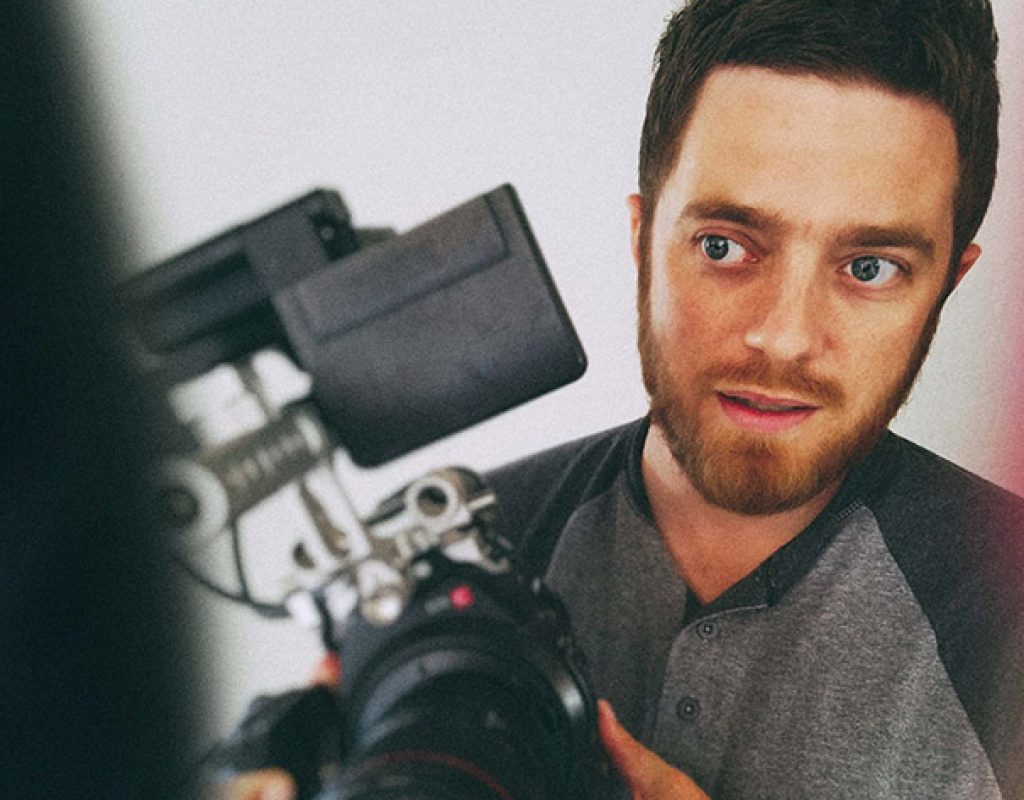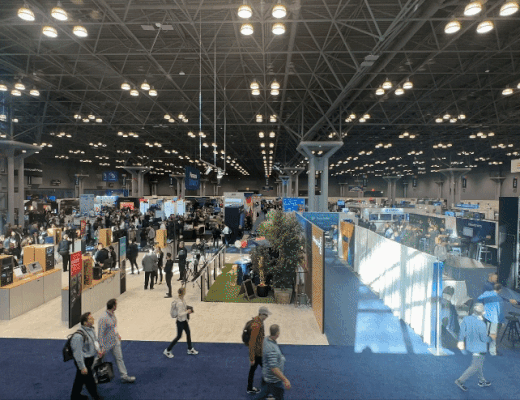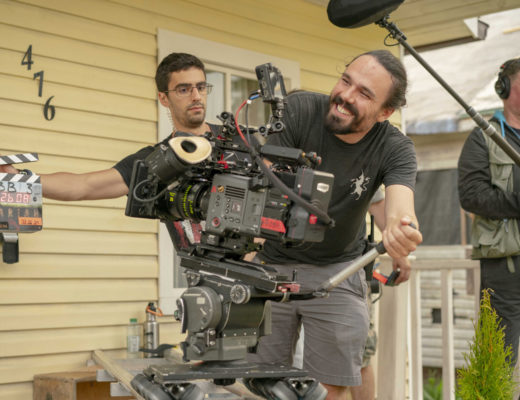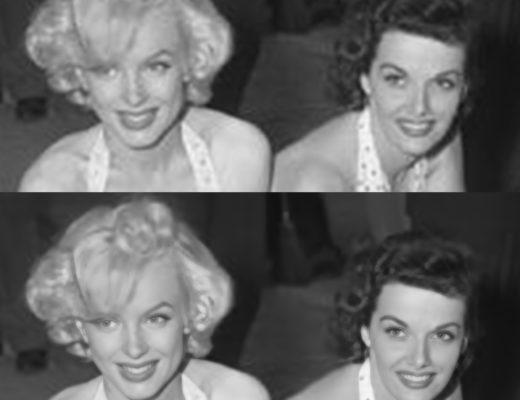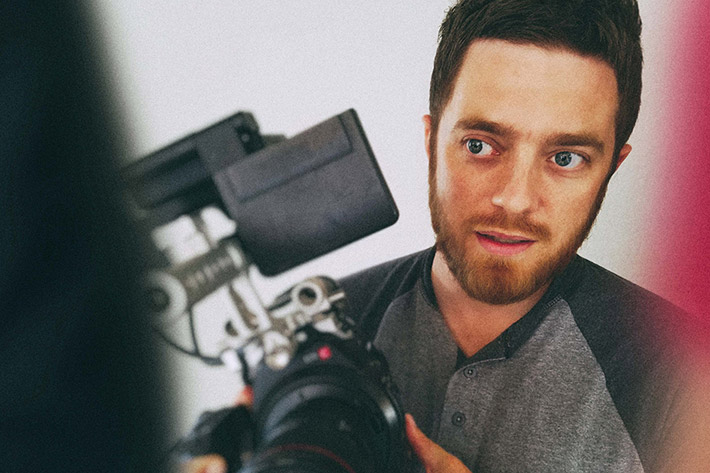
Charlie Parish put a camera on his shoulder, either a Canon Cinema EOS C300 or C500, and took off after the rap mogul. The result is a four-part documentary called The Defiant Ones. And this interview!
Directed by Allen Hughes, The Defiant Ones tells the stories of rapper Dr. Dre and producer Jimmy Iovine – the latter the son of a Brooklyn longshoreman, the other one of the greatest rappers alive – and their long-standing partnership which has shaped not just the rap music world but a plethora of transformative pop culture events.
To capture Dre’s world, Hughes’ longtime collaborator Charlie Parish put a camera on his shoulder (using the Canon Cinema EOS C300 and C500 in turns) and took off after the rap mogul. Over the course of 3 years, Charlie spent an average of one full day a week filming Dre, capturing his professional life and his daily life, and even his family life during vacations and a month spent on his private boat.
The final footage captured throughout that time was edited in with archival footage as well as pieces of over 15 hours of seated interviews with Dre, and countless other hours with Iovine and their colleagues and contemporaries. The HBO documentary premiered a couple of months ago, and now ProVideo Coalition shares with its readers an interview with Charlie Parish. Interviews, either live or done using modern technology, are a collaborative effort, and this one would not be possible without all the people that connected me with Charlie Parish and made every effort possible to make this happen. A big thank you to Charlie Parish, who accepted the challenge and took the time to answer this set of questions, which I believe everyone would like to ask him. So, without further ado, let’s dive into the interview.
ProVideo Coalition – In your Twitter page you present yourself as Director, Cinematographer, Producer and paranormal nut. Who is Charlie Parish?
Charlie Parish – Straight away with a tough one as I’m really still working that out! In my work, I consider myself a filmmaker – I’ve learnt many roles including Cinematographer and producer but where I feel my true talent lies is in directing. I’m currently looking for representation as a director and that’s how I would like to be perceived by others in the industry.
However, my absolute passion in life is the investigation of the unknown. In life I truly am a paranormal nut!
PVC – What is a Britishman doing in LA?
CP – I ask myself that a lot! Well, I guess it’s tied in to the first question as when I started in the film industry (2001), I had to accept any role I could. I was a ‘jack of all trades’ which is probably the same for many people entering the film industry. I was having very little success gaining employment at home in the UK and was lucky enough to gain opportunities out here although it was all ‘work experience’.
This is where I’ve built a real contact list and it’s certainly the epicenter of film, so I think I chose well.
PVC – You were the “shadow” – once a week – of Dr. Dre for three years, I am told, to capture footage for The Defiant Ones. How does one cinematographer organize life to shoot someone for such a long period of time?
CP – It wasn’t as rigid as once a week and when I really think about it, I would average it out at 3 times per week. I would work to the schedules of Dre and Jimmy which were very very varied as they were so busy – These guys don’t stop!
I actually started the project with Director Allen Hughes back in the spring of 2014 – before HBO even entered the frame – so I had already prepared to be in it for the long haul. I didn’t expect 3+ years but I don’t think anybody did.
I do find documentary filmmaking far more difficult than scripted projects – I like a schedule, a storyboard, a call sheet. We had very little of that and I just had to be ready at all times. Although the random work hours pained me on occasion, it was what I signed up for. I missed a lot of football (soccer) games and there were a few times I had to suddenly leave a party or a family thing to go shoot for the show. It was non-stop and going about my daily life with that anxious, ‘on call’ feeling was the norm.
PVC – Did you follow more people who appear in the documentary and/or captured footage for other segments of the documentary, or were you tasked with following Dr. Dre?
CP – Yeah absolutely, I was across the board. I shot a number of the interviews, I was also on B Cam (CU) for pretty much all of the interviews. I shot a lot of the reconstruction scenes, drone shots, time-lapse, B roll and Inserts and the majority of the verite stuff. I was on call 24/7. If Dre had an artist in the studio at 1130p on a Tuesday night, I was there. If Jimmy was flying out to NYC in 2 hours time, I was on the jet. If the skies look great and conditions were right, I’d run out and shoot a time-lapse.
I was lucky enough to collaborate with some supremely talented DPs along the way, though. Vincent Wren and Shane Daly really helped to create many of the stunning interviews conforming to the style we set out at the start. We even had Peter Deming shoot an interview which was a beautiful moment for me as he was the first person to guide me to my first work experience in film in 2000. Jerry Henry, Edwin Stevens and Guido Passi shot some wonderful verite stuff during major events.
My right hand throughout, though, was my AC, Joshua Makela. He’s a brilliant, young DP in his own right. He and I would run and gun when needed and he was a huge help.
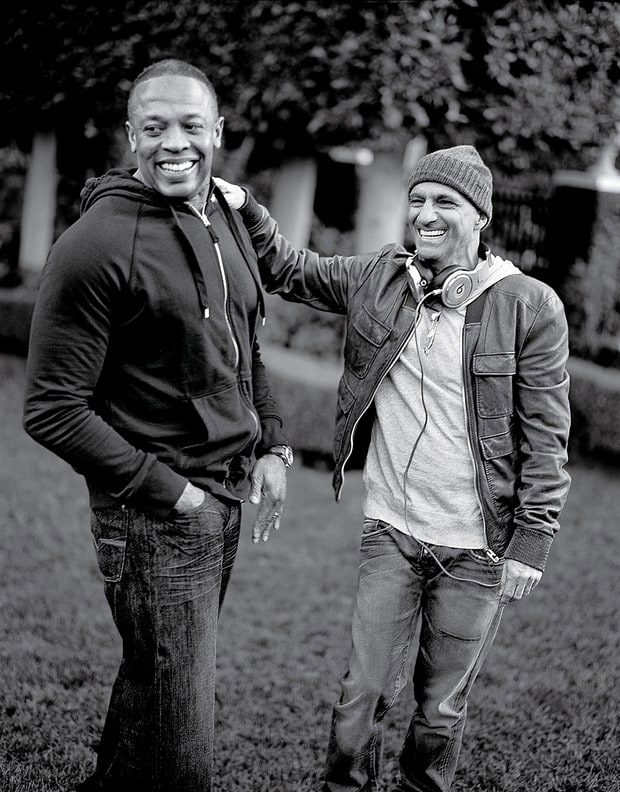 PVC – Apparently, you met Dr. Dre while filming an Eminem show at Wembley, in 2014. You said in an interview, that you both “seemed to click straight away about our love for cameras and how I was shooting”, and that “a long-standing relationship was born then”. What camera were you using at the time, do you remember? Did you and Dr. Dre discuss(ed) cameras?
PVC – Apparently, you met Dr. Dre while filming an Eminem show at Wembley, in 2014. You said in an interview, that you both “seemed to click straight away about our love for cameras and how I was shooting”, and that “a long-standing relationship was born then”. What camera were you using at the time, do you remember? Did you and Dr. Dre discuss(ed) cameras?
CP – Yeah, it was 2014 at the Eminem show in London. I had met Dre once before when I was in the mix on The Hughes Brothers’ “The Book of Eli” but this was the first time we spoke at length. I was shooting with the C500, C300 and the 5D Mk III. He really took an interest in the cameras and asked me: Why I was shooting certain things? How I was shooting certain things? Why I chose that particular camera? He then revealed that he shoots stills and proceeded to show me some of his photos. As you can probably guess, he’s brilliant at that too!
A funny story to this was after the first show, Dre invited me on to his yacht in the Mediterranean with his friends, which Allen Hughes was part of – I actually believe Allen orchestrated this as he so brilliantly does. He knew he wanted a camera on board capturing Dre in his ‘relaxed’ mode.
At Wembley, Allen had wanted me to shoot what he described as an iconic shot of Dre entering the stage. As there was back to back shows, I had two chances to shoot this…to get it right. On both nights I tripped up on the stairs and ruined both the shots. When we reviewed the footage, I saw the disappointment on everybody’s face, including Dre. I was gutted and didn’t sleep a wink that night. I was certain Dre wouldn’t want ‘Unsteady Eddie’ shooting on the boat when I had failed so miserably.
However, I really do think there was an instant connection and he understood it was just that – a slip up. Dre’s wife, Nicole, was also a huge comfort during this episode. I’m not sure how she did it but I remember I felt she was in my corner. He has only brought it up once since and we have had a good laugh about it.
PVC – The story of how you got Dr. Dre to have his own United shirt is popular now. Were you already filming him for the The Defiant Ones documentary at the time you decided to give him a shirt?
CP – Yes, this was the second yacht trip I was invited to. It was to celebrate Dre’s 50th birthday and it was another opportunity to capture him when he was at his most relaxed. Although it was a new relationship built through the work we were doing, Dre treated me so wonderfully during the year and I wanted to thank him. The only way I could think to do that was to give him something involving one of my passions– a signed Manchester United shirt!!
PVC – You were at Dr. Dre’s 50th birthday – when you offered him the United shirt. Were you there to film the whole event too?
CP – Yeah, Allen and I were there on the trip and we were able to capture some really beautiful, intimate footage. It’s hard to escape from a boat in the middle of the ocean so Allen was able to corner Dre easily! There was plenty of down time but we tried to schedule something once a day.
PVC – How does one manage to keep being objective when filming someone who is more than the subject of a documentary, because you’ve, as you say, a long-standing relationship? Is there a moment when you put the camera down? How does it work to balance the friendship and the cinematographer’s duty?
CP – Again, there was plenty of times when the camera was off and it was just friends having a really good time but Allen, Dre and I put in some real work too. As I said previously, Allen knew he needed to integrate someone who could capture his investigation into Dre and Jimmy’s world without that person interfering or throwing off the dynamic he was creating. His directive to me was, “Merge into the background, become wallpaper, make yourself invisible”. After many many sessions of being the only person in the room with them, it just became normal. They trusted me and Allen trusted me.
After years of being in their company, getting to know them and becoming friends, it’s a natural thing to root for them. I wanted them to win. When Allen asked the tough questions and sensitive issues were brought up, I remained impartial in my operation but it did affect me greatly. Here’s Dre being quizzed about something that makes him uncomfortable and my view is an ECU of his face. It was uncomfortable for me too. I can only imagine how Allen was feeling trying to draw things out of his friends of 25 years!
PVC – Considering that Allen Hughes tells his team to “Don’t ever cut until the subject is off the set” and that for this documentary, as he described in an interview with IndieWire, he “was trying to find the real person between the lines”, how do you follow his “rules” and when do you decide it is time to stop capturing footage?
CP – This was never difficult for the crew. He just made it clear from the outset that this was the technique he was using. If he called “cut”, we would respond with the question, “hard cut?”. If Allen said “no”, we kept rolling. Really simple but very effective.
PVC – I believe you’re mostly on your own or with a small team throughout the three years following Dre. Having worked long with Allen Hughes I believe you know what he wants, but how does it work for you to know exactly what he is after from each new session? Or do you just capture whatever you deem as important, and then go through the footage with Hughes to decide what goes in and out?
CP – Allen would send me out to follow Dre or Jimmy. He’d send me to cover a studio session, shoot a drone shot, shoot B-roll, a time-lapse etc… We’ve worked together for the last 17 years so I mostly had a firm understanding of what he wanted. The majority of the time it worked and he liked what was shot but sometimes he would send me to shoot it again. There were times he gave me homework which involved watching a certain film and referencing a particular style or shot. I don’t think I know anyone who knows cinema like Allen so he was always able to reference something to show how he wanted things shot. It worked well although sometimes, it was just too difficult to get results with just me, a camera and a couple of lights.
PVC – The final documentary is some five hour long, and it is a mix of new and old footage. How many hours of footage have you captured for this project?
CP – Oooph. This film must have the most footage ever shot…it must certainly be up there. For me personally, I shot hours and hours. Then add to that, the wonderful archival footage that Ryan Gallagher, a producer on the show, unearthed. Hmmmm… I couldn’t even guess. Maybe HBO has a complete building of hard drives holding The Defiant Ones footage. There was just so much. I’m sure the doc could have been 20 hours long!
PVC – For this project you relied on Canon cameras. Which models, and why?
CP – We used the C500, C300 and 5D Mk III. The footage I saw around the time we started the doc really impressed me and I personally owned the 5D so it was an easy choice. I know there are lots of higher spec and higher priced cameras out there but these 3 models were real work horses and could be used with minimal ‘dangleage’. For interviews and much of the b-roll, I used the C500 recording 4k Raw to the Odyssey 7Q. For the run and gun, I used the C300 and 5D Mk III. Time lapses were on the 5D Mk III and more recently the Mk IV.
These cameras produced a great image and the thing that was really impressive was the low light capabilities. I was shooting in really dark studios on many occasions but knew I was still getting a useable image even at high ISOs. This was what we chose over 3 years ago but I still shoot with the C300 – I can’t wait to to get my hands on the updated versions!
Luckily for shooting DPs like me, these cameras are very forgiving. There were times when I was a little down after reviewing the footage but the issue was on how I shot it and not how the camera performed.
PVC – Did you have different gear sets for different situations? How does one prepare, gear wise, for a three year project filming someone? Please, feel free to explain everything you can about this aspect of your work.
CP – This was so simple for me. I would load the car up with everything I had. Once I was at the location, I would judge whether it called for a drone, slider, lights etc… Sometimes it was just the bare bones of the C300, Monopod and radio mics and shotgun mic.
The good thing about this is, if you take everything with you, you’re never caught out.
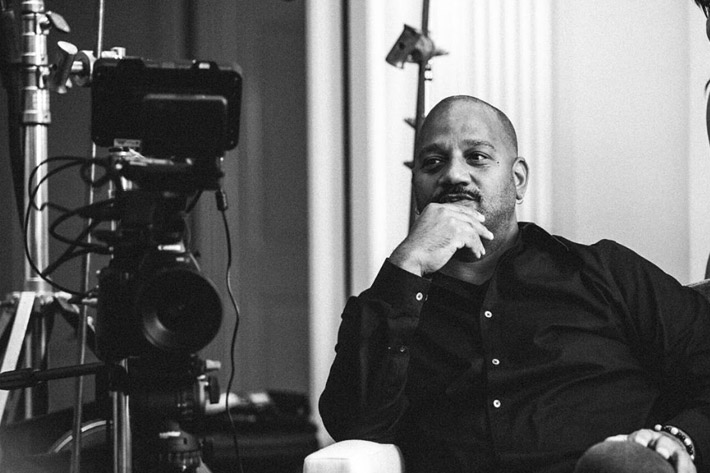
PVC – Allen Hughes said in an interview that this documentary was built to be, it had to be “an emotional ride”? Was it also also an emotional moment for you? Have you ever been working a specific human subject for so long? How does it change one’s perception as a cinematographer? Does it change it?
CP – This was the most difficult 3+ years of my life. It was so difficult for everyone involved because we lived it. Also going on past 3 years was tough. I just had to try and constantly remind myself of how lucky I was to just be in employment but also, I was in the company of the most incredible person I had ever met in Dre. There were certainly many many ‘writers block’ moments for me as I don’t know anyone less interested in pop culture than myself – I’ve always been the ‘weird kid’ who wondered about other life elsewhere in the universe, not what the latest trends are. Trying to find the creative spark daily was a struggle and I tried to absorb the excitement from those around me. Most of the crew are obviously huge music fans which really helped. I just knew that when I was setting the shot and the cameras were rolling, all my anxieties disappeared. So yeah, it was a hugely emotional ride.
PVC – You wrote on your Twitter feed, December 8, 2016, this “Three years in the making. Three years of absolute top secret film making…finally…” Guess it was about The Defiant Ones. Was it hard to keep this project secret?
CP – It was difficult. People always ask: What project are you on? What’s it about? When is it coming out? It wasn’t like there was a gag order but we all realized that word travels fast in town and we didn’t want to chance compromising the authenticity of the piece by revealing things early.
PVC – Did you work on other projects as well during this time? Which, if you can mention them?
CP – I worked on little bits here and there but The Defiant Ones was my job so it took priority. I was able to develop a project I have had on the back burner for a few years which I have now hit full production on. It’s a funny piece called “Resolution” about a disillusioned guy in his mid-30’s and his ‘against the odds’ decision to fulfill his childhood dream of becoming a professional basketball player. I’m finding this one difficult too – it’s another documentary!!!
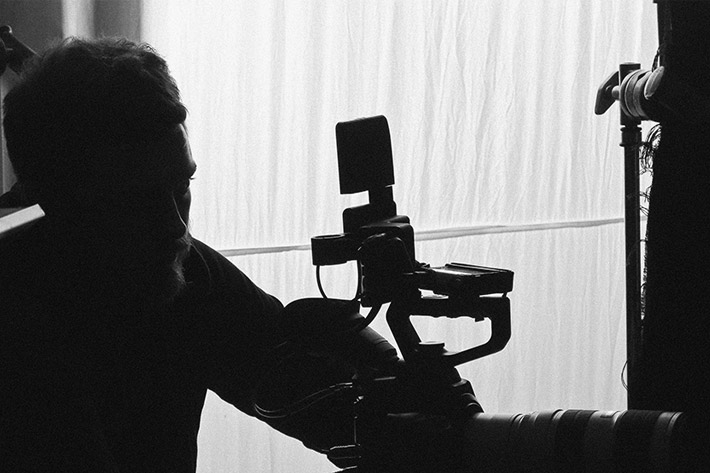
PVC – You’ve worked with Allen Hughes in other projects before. Which one do you remember as the most exciting?
CP – That’s another tough one. They have all been memorable periods of my career. I guess “The Book of Eli” was the most exciting. It was the first time I had a director credit as I was shooting the second Unit but it also gave me the confidence that I could actually do it.
PVC – What’s next for Charlie Parish?
CP – Lots!! As mentioned I am now shooting my own movie – in production as we speak. That should take around 18 months to complete. I have spoken with Dre about a couple of movie ideas that he liked, so hopefully something could come of that.
I also have a really interesting project going on that I believe will change the movie industry at every level. That involves apps, websites and techy stuff. I had this idea in 2004 that nobody ever took interest in but my fellow The Defiant Ones producer, Ryan Gallagher, almost choked on his beer when I told him a few months ago and since, people have taken notice. It’s one of those, “I can’t believe it’s not been done?” ideas. We are already in the building stage with the techy folk. I seriously believe directors, cinematographers, indie filmmakers and major studios alike will benefit from this project. Watch this space!!

Filmtools
Filmmakers go-to destination for pre-production, production & post production equipment!
Shop Now